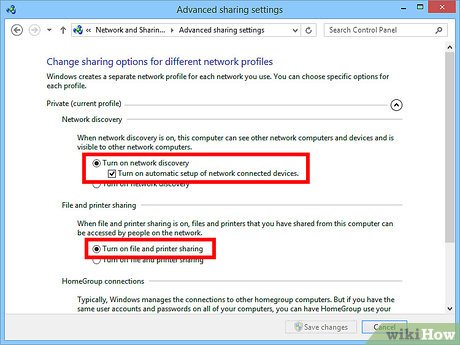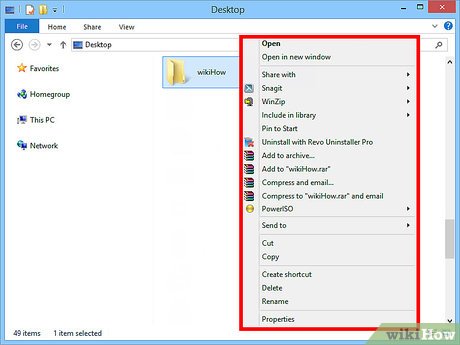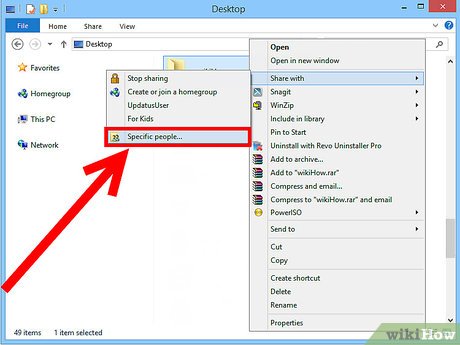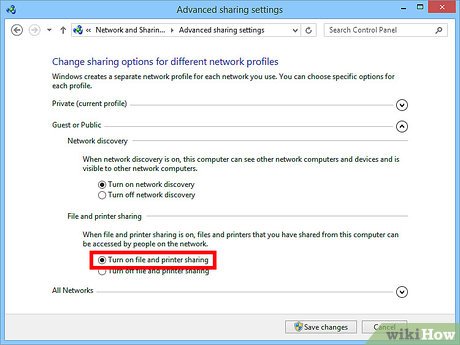How to Share a Folder
Method 1 of 3:
Windows
Sharing Specific Folders
-
 Ensure that File and Printer Sharing is enabled. In order to share specific folders, you will need to have this feature enabled. The method for enabling it varies slightly depending on which version of Windows you are using. It is highly recommended that you do not enable folder sharing when on a public network such as a school or coffee shop.
Ensure that File and Printer Sharing is enabled. In order to share specific folders, you will need to have this feature enabled. The method for enabling it varies slightly depending on which version of Windows you are using. It is highly recommended that you do not enable folder sharing when on a public network such as a school or coffee shop.- Windows 10 - Open control panel and click Network and Internet. Click Network and sharing center. Click Change advanced sharing settings to the left of your network name.
- Windows 8 - Right-click on the Network icon in your system Tray in the Desktop view and select "Network and Sharing Center". Click the "Change advanced sharing settings" link. Expand the profile that you want to enable sharing on (Private or Public). Turn on both "Network discovery" and "File and printer sharing". Click the "Save changes" button and enter your administrator password if necessary.[1]
- Windows 7 - Click the Start button, type "control panel", and press ↵ Enter. Double-click the "Network and Sharing Center" icon. Click the "Change advanced sharing settings" link. Expand the profile that you want to enable sharing on (Home/Work or Public). Turn on both "Network discovery" and "File and printer sharing". Click the "Save changes" button and enter your administrator password if necessary.[2]
- Windows Vista - Click the Start menu and select Control Panel. Click Network and Internet, and then select Network and Sharing Center. Expand the "Network discovery" and "File and printer sharing" entries in the "Sharing and Discovery" section. Make sure both are turned on. Click the "Save" button for each entry.
- Windows XP - Click the Start button and select Control Panel. Open Network Connections. Right-click on your network connection and select Properties. Check the "File and Printer Sharing for Microsoft Networks" box.
-
 Find the folder you wish to share. Once File and Printer Sharing has been enabled, you can share any folder on your hard drive with other people on your network. Navigate to the folder that you want to share using Explorer. Right-click on it.
Find the folder you wish to share. Once File and Printer Sharing has been enabled, you can share any folder on your hard drive with other people on your network. Navigate to the folder that you want to share using Explorer. Right-click on it. -
 Select the "Share with" option. This will open the Sharing submenu. You can choose to share it with everyone in your Homegroup or select specific people to share it with.
Select the "Share with" option. This will open the Sharing submenu. You can choose to share it with everyone in your Homegroup or select specific people to share it with.- When choosing a Homegroup option, you can allow other Homegroup members to both read and write to the folder, or limit them to just read from it.
-
 Click the "Specific people" option to select which users you want to share with. This will open a new window with a list of all the users that currently have access to the folder. You can add users to this list and give them specific permissions for the folder.
Click the "Specific people" option to select which users you want to share with. This will open a new window with a list of all the users that currently have access to the folder. You can add users to this list and give them specific permissions for the folder.- To share the folder with everyone, click the dropdown menu at the top and select "Everyone". Click the Add button.
- To share with specific users, click the dropdown menu and select them or type in the name and click Add.
-
 Set permissions for users on the list. Find a user on the list that you want to change the permissions for. Look in the Permissions Level column, and click the arrow next to the existing permission. Select the new one from the list.
Set permissions for users on the list. Find a user on the list that you want to change the permissions for. Look in the Permissions Level column, and click the arrow next to the existing permission. Select the new one from the list.- Read - User can see, copy, and open files from the folder, but cannot change files or add new ones.
- Read/Write - Besides Read abilities, users can change files and add new files to the shared folder. Files can be deleted by users with Read/Write permissions.
- Remove - Removes permissions for this user, and removes them from the list.
-
 Click the Share button. Your permission settings will be saved, and the folder will be available on the network for all allowed users.
Click the Share button. Your permission settings will be saved, and the folder will be available on the network for all allowed users.
Using Public Folders
-
 Enable Public folders. Public folders are folders that are always shared with anyone that is connected to the network. Anyone can read and write to Public folders, and there are no special permissions required. Public folders are turned off by default unless you are in a Homegroup.
Enable Public folders. Public folders are folders that are always shared with anyone that is connected to the network. Anyone can read and write to Public folders, and there are no special permissions required. Public folders are turned off by default unless you are in a Homegroup.- Windows 8 - Right-click on the Network icon in your system Tray in the Desktop view and select "Network and Sharing Center". Click the "Change advanced sharing settings" link. Expand the "All Networks" section. Look in the "Public folder sharing" section and toggle it on. Click the "Save changes" button.
- Windows 7 - Click the Start button, type "control panel", and press ↵ Enter. Double-click the "Network and Sharing Center" icon. Click the "Change advanced sharing settings" link. Expand the profile that you want to enable Public folders on (Home/Work or Public). Look for the "Public folder sharing" section and toggle it on. Click the "Save changes" button and enter your administrator password if necessary.
- Windows Vista - Click the Start menu and select Control Panel. Click Network and Internet, and then select Network and Sharing Center. Expand the "Public Folder" entry in the "Sharing and Discovery" section. Toggle it on and then click the "Save" button.
-
 Enable or disable Password Protected Sharing. In the same place that you found the Public folder controls, you can find the password protected sharing options. Turning this feature on means that only people who have a user account and password on the same computer can access the Public folder. If this is on, users on other computers will not be able to access the folder.
Enable or disable Password Protected Sharing. In the same place that you found the Public folder controls, you can find the password protected sharing options. Turning this feature on means that only people who have a user account and password on the same computer can access the Public folder. If this is on, users on other computers will not be able to access the folder. -
 Find your Public folders. Once the folder has been enabled, you can start adding things to it to be shared with everyone on the network. The Public folder is part of the Libraries view, and is accessed slightly differently depending on your version of Windows. There is a Public folder in each of the Libraries (Documents, Music, Pictures, and Videos).
Find your Public folders. Once the folder has been enabled, you can start adding things to it to be shared with everyone on the network. The Public folder is part of the Libraries view, and is accessed slightly differently depending on your version of Windows. There is a Public folder in each of the Libraries (Documents, Music, Pictures, and Videos).- Windows 8 - Libraries are not displayed by default in Windows 8. To see them, click This PC to open Explorer. Click the View panel, and then click the "Navigation pane" button on the far left. Click the "Show libraries" option to make the Libraries folder display in the sidebar. Expand the library that you want to add files to, and open the corresponding Public folder that appears.[3]
- Windows 7 - Click Start and select Documents. In the left pane, expand the Libraries and Documents folders, and then select Public Documents. You can also choose Public folders in the other libraries as well.
- Windows Vista - Click Start and select Documents. In the left pane, click the Public link in the "Favorite Links" section. If you don't see it, click More and then select Public. Choose the Public folder that you want to add files to.
-
 Add files. You can add and move files in Public folders just like you would in any other folder. You can copy and paste from other locations, or drag and drop files.
Add files. You can add and move files in Public folders just like you would in any other folder. You can copy and paste from other locations, or drag and drop files.
Method 2 of 3:
Mac OS X
-
 Open System Preferences. Click the Apple menu and select System Preferences. Make sure that you are logged in as an Administrator.
Open System Preferences. Click the Apple menu and select System Preferences. Make sure that you are logged in as an Administrator. -
 Click the Sharing button. This is located in the Internet & Wireless section of the System Preferences. This will open the Sharing window.
Click the Sharing button. This is located in the Internet & Wireless section of the System Preferences. This will open the Sharing window. -
 Enable File Sharing. Check the box labeled "File Sharing" in the left frame. This will turn file sharing on for your Mac, and will allow you to share files and folder to other users and other computers on the network.
Enable File Sharing. Check the box labeled "File Sharing" in the left frame. This will turn file sharing on for your Mac, and will allow you to share files and folder to other users and other computers on the network. -
 Add folders you want to share. Click the "+" button to open the Finder window. Browse for folders that you would like to share. If you want to share a specific file, you'll need to create a special folder for it. Click Add when you've selected a folder.
Add folders you want to share. Click the "+" button to open the Finder window. Browse for folders that you would like to share. If you want to share a specific file, you'll need to create a special folder for it. Click Add when you've selected a folder. -
 Share the folder to Windows computers. By default, shared folders will only be accessible by other Mac computers. If you want to share it with Windows users, select the folder in the Shared Folders list and click Options. Check the "Share files and folders using SMB (Windows)" and then click Done.
Share the folder to Windows computers. By default, shared folders will only be accessible by other Mac computers. If you want to share it with Windows users, select the folder in the Shared Folders list and click Options. Check the "Share files and folders using SMB (Windows)" and then click Done.- You can set permissions for the folder using this
-
 Set permissions for the folder. Select the folder in the Shared Folders list. The Users list to the right will show what users are currently allowed to access the folder. Click the "+"" or "-" buttons to add or remove users from the list of allowed users.
Set permissions for the folder. Select the folder in the Shared Folders list. The Users list to the right will show what users are currently allowed to access the folder. Click the "+"" or "-" buttons to add or remove users from the list of allowed users.
Method 3 of 3:
Linux
-
 Install the software to mount the shared folder. To access a Windows shared folder, you'll need to install the SMB protocols to allow it.To do this, open the Terminal (Ctrl+Alt+T) and type sudo apt-get install cifs-utils.
Install the software to mount the shared folder. To access a Windows shared folder, you'll need to install the SMB protocols to allow it.To do this, open the Terminal (Ctrl+Alt+T) and type sudo apt-get install cifs-utils. -
 Create a folder to act as the mounting location for the shared folder. Create a folder somewhere that is easily accessible. You can do this from the GUI desktop or from the terminal using the mkdir command. For example, to create a folder called "sharedfolder" on your desktop, type mkdir ~/Desktop/sharedfolder.
Create a folder to act as the mounting location for the shared folder. Create a folder somewhere that is easily accessible. You can do this from the GUI desktop or from the terminal using the mkdir command. For example, to create a folder called "sharedfolder" on your desktop, type mkdir ~/Desktop/sharedfolder. -
 Mount the folder. Once you've created a folder to act as the mounting location for the shared folder, you can mount it to link it to the Linux computer. Open the Terminal again and enter the following command (Based on the previous example of creating the folder "sharedfolder"):
Mount the folder. Once you've created a folder to act as the mounting location for the shared folder, you can mount it to link it to the Linux computer. Open the Terminal again and enter the following command (Based on the previous example of creating the folder "sharedfolder"):- sudo mount.cifs //WindowsComputerName/SharedFolder /home/username/Desktop/sharedfolder -o user=WindowsUsername
- You will be asked for the root password for your Linux installation as well as the password for the Windows user account.
-
 Access the folder. Opening the mounted folder will allow you to access the files. You can add and remove files as you would any other folder. You can also use the terminal to access the files in the shared folder.
Access the folder. Opening the mounted folder will allow you to access the files. You can add and remove files as you would any other folder. You can also use the terminal to access the files in the shared folder.
-
 Install Samba. Samba is open source software that allows you to share your folders with Windows users. You can install Samba from the Terminal by typing sudo apt-get install samba.[4]
Install Samba. Samba is open source software that allows you to share your folders with Windows users. You can install Samba from the Terminal by typing sudo apt-get install samba.[4]- Once Samba has installed, create a username by typing smbpasswd -a username. You will be asked to create a password as well.

-
 Create a directory to share. You can also use any existing directory, but it can useful to be able to easily tell which of your folders are being shared with other computers. Use the mkdir command to create the folder.
Create a directory to share. You can also use any existing directory, but it can useful to be able to easily tell which of your folders are being shared with other computers. Use the mkdir command to create the folder. -
 Open the Samba configuration file. Type sudo vi /etc/samba/smb.conf. You can use any file editor, "vi" is just an example. The Samba configuration file will open in the editor. Scroll to the bottom of the file and add the following lines:
Open the Samba configuration file. Type sudo vi /etc/samba/smb.conf. You can use any file editor, "vi" is just an example. The Samba configuration file will open in the editor. Scroll to the bottom of the file and add the following lines:[{{}}] path = available = yes valid users = read only = no browsable = yes public = yes writable = yes- You can change the settings as you need, such as making the folder read only, or making it not public.
- You can add multiple entries to the file for multiple shared folders.
-
 Save the file. Save the configuration file and close the editor. Restart the SMB service by typing sudo service smbd restart. This will reload the configuration file and apply the settings to your shared folder.
Save the file. Save the configuration file and close the editor. Restart the SMB service by typing sudo service smbd restart. This will reload the configuration file and apply the settings to your shared folder. -
 Get your IP address. In order to link the folder in Windows, you will need the IP address of the Linux computer. Type ifconfig in the Terminal and note the address.
Get your IP address. In order to link the folder in Windows, you will need the IP address of the Linux computer. Type ifconfig in the Terminal and note the address. -
 Access the folder in Windows. Create a new shortcut anywhere on your Windows computer by right-clicking and selecting New → Shortcut. Type in the location of the folder you created in Linux, using the IP address: IP addressfoldername. Click Next, name the shortcut, and then click Finish. Opening the new shortcut will allow you to see the contents of the shared folder.
Access the folder in Windows. Create a new shortcut anywhere on your Windows computer by right-clicking and selecting New → Shortcut. Type in the location of the folder you created in Linux, using the IP address: IP addressfoldername. Click Next, name the shortcut, and then click Finish. Opening the new shortcut will allow you to see the contents of the shared folder.
Share by
Micah Soto
Update 04 March 2020


























